Shakespeare scholars try to see off the Bard's doubters
- Published
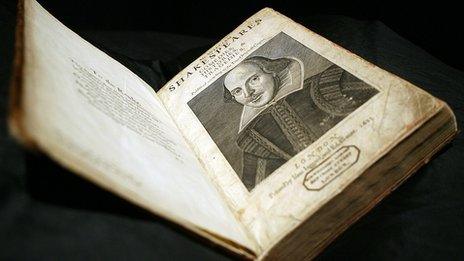
The authorship of the plays has been under scrutiny since the 19th Century
This is the 449th birthday of William Shakespeare. Well, actually, it might be his birthday, because we don't really know when he was born.
There is a date for his baptism - with his name recorded in Latin as "Gulielmus" - and then it's a case of working back a few days.
It's an educated guess. And much of the endless debate about the identity of the author of Shakespeare's plays is because so much of the presumed life story is educated guesswork.
But a new book - William Shakespeare Beyond Doubt - wants to put the record straight once and for all, as a forthright counterblast against those who question his authorship.
Stanley Wells, honorary president of the Shakespeare Birthplace Trust and eminent Shakespearean scholar, now aged 82, has marshalled an international line-up of academics to defend the Bard.
This literary raiding party rounds up and brings to book claimants such as the Earl of Oxford, Christopher Marlowe and Francis Bacon.
'Snobbery'
But why have there been so many questions about the identity of the author?
"I think the phenomenon goes down partly to snobbery; to a feeling of resentment, even anger, that someone from a relatively humble background should have been able to create such works of genius," says Prof Wells.
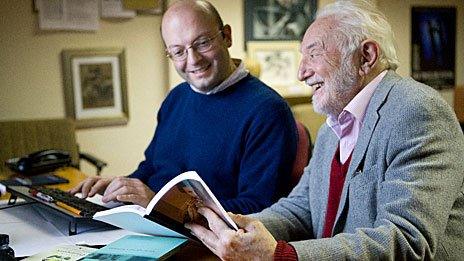
Paul Edmonson and Stanley Wells set out a firm rebuttal of authorship doubts
He also rejects as ill-informed the suggestion that Shakespeare's limited formal education rules him out as the author of the plays.
"A lot of it is due to ignorance, especially of the Elizabethan educational background, of the sort a boy in Stratford could have got at the local grammar school.
"It was rather limited, but a very intense classical education, in rhetoric and oratory, speaking Latin from the time they were eight years old, having to speak it in the classroom and the playground."
Co-editor Paul Edmondson, head of research at the Shakespeare Birthplace Trust, says the authorship attacks are part of a wider culture of conspiracy theories.
There is a constant curiosity to show that "reality is not what it seems".
Rival claims
But the book also shows how long this struggle has been running.
In the 1850s there were claims for Francis Bacon. When this fell out of fashion, Christopher Marlowe was touted as the secret author, with the argument that he had faked his death and borrowed Shakespeare's name for his writing.
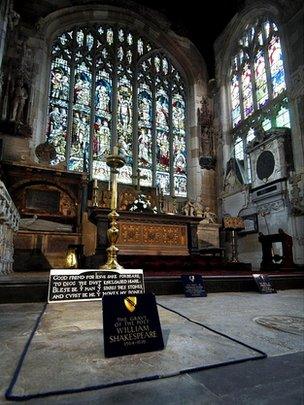
Shakespeare's grave: The church's altar was buried and hidden for safekeeping during the Reformation
This theory was somewhat scuppered in the 1920s when the coroner's report from Marlowe's inquest was discovered. He might have been killed in very suspicious circumstances, but he was fairly unambiguously dead and buried before many of Shakespeare's plays had been written.
Edward de Vere, the 17th Earl of Oxford, has since become the most popular alternative author. Much of the claim reflects his supposed greater suitability as writer - better travelled, more familiar with the court and whose own life is seen as paralleling some of Shakespeare's literary characters.
In this version of events, the professional theatre man Shakespeare is seen as the convenient pseudonymous cloak for Oxford's literary gifts.
In turn, the Shakespearean scholars robustly reject this claim as lacking any credible supporting evidence - and dismiss it as a hankering after aristocratic glamour.
Growing doubts
But what has stirred Prof Wells, who has edited the Oxford Shakespeare for 35 years, is his worry that this question about Shakespeare's authentic authorship seems to be entering the mainstream.
"What's annoying is that it's spreading," he says.
A Declaration of Reasonable Doubt About the Identity of William Shakespeare has gathered prominent signatories, with the claim that there is insufficient unambiguous evidence to link the man from Stratford and the plays attributed to his name.
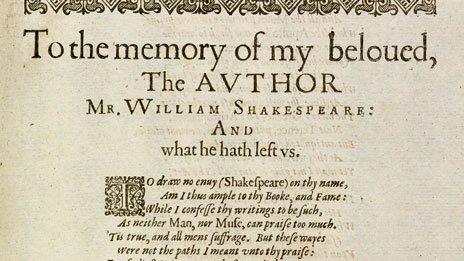
The Bodleian Library's First Folio from 1623 has been put online for the first time
And a movie, Anonymous, fanned the embers of the idea that the Earl of Oxford was the true author.
Prof Wells, like one of Shakespeare's own grey-haired faithful retainers, has gone into battle once again.
"It's quite true that we don't know as much as we would like to know about Shakespeare. However, we do know more about him than most writers of his period."
Demolishing rival claims is much more straightforward than standing up Shakespeare's.
But Prof Wells and Mr Edmondson say there is nothing strange or mysterious about the shortage of documentation or lack of information about parts of Shakespeare's life.
Their book lists the contemporary mentions of Shakespeare, showing that he did live and work in the theatrical world of London, and there were no challenges either to his identity or his authorship of the plays.
There are contemporary references to the Earl of Oxford and Shakespeare that show that they were seen as separate authors.
The book asserts that the structure of the plays, such as doubling up of parts, shows the work of a man with a deep practical professional knowledge of the theatre rather than an amateur dilettante poet.
And the argument that Shakespeare's work involved collaboration is shown as further proof of the authenticity of his historical role as author.
If Shakespeare was co-writing alongside the likes of Thomas Middleton, it embeds him even more clearly as a real-life practising playwright.
Degree of doubt
Prof Wells describes this growing awareness of such collaboration as the most significant recent advance in Shakespearean scholarship.
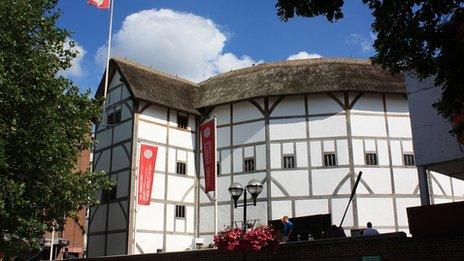
Shakespeare's Globe on London's Bankside runs plays for thousands of teenagers each year - and half have never been to a theatre before
But he is much less enthusiastic about how questions over the plays' authorship have also now entered the academic mainstream.
William Leahy, of Brunel University, is convenor of an MA degree in Shakespeare authorship studies - and he defends the legitimacy of approaching the identity of the playwright as an open question.
Dr Leahy rejects the claims of Oxford, Bacon and Marlowe, but he does not accept the idea of a single author.
Instead he believes the plays were the work of six to eight different writers, including Shakespeare, who contributed to plays in a way that was "complex and messy".
Rather than the collected works of Shakespeare, he thinks there should be the collected authors.
In this version, Shakespeare was a broker of plays, organising, editing and writing scripts, but not necessarily the prime author of all the plays now attributed to him.
Loose threads
Dr Leahy says the absence of personal evidence from Shakespeare's life is curious, to say the least - and that documentation that once appeared to exist has gone missing.
The lack of certainty about Shakespeare makes him a blank canvas on which others can project their own emotions, and Dr Leahy says this can create very strong feelings if this identity is challenged. He has had hate mail from angry Shakespeare fans.
But he argues that there are too many loose threads to ignore: "It's not a simple story."
It might also be that this will never be resolved. Shakespeare lived in a dangerous and secretive era. In the church in Stratford-upon-Avon where he is buried, the altar stone had been buried and hidden for safekeeping during the upheavals of the Reformation.
Shakespeare's story looks set to be dug up on many more occasions.
- Published25 April 2012
- Published9 April 2013
- Published8 June 2011
- Published22 April 2013
- Published25 October 2011